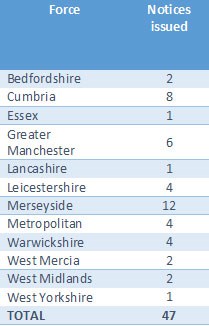28 Oct 2020
Crime is lower than a year ago, and more fines given to the public under Coronavirus regulations
Provisional data from police forces in England and Wales shows police recorded crime is six per cent lower than in the same period as 2019. Fixed Penalty Notices (FPNs) given to the public for breaches of Coronavirus Regulations are rising as restrictions are reapplied.
Snapshot figures released today based on preliminary police recorded crime provided to the National Police Chiefs’ Council from 43 forces in England and Wales (excluding fraud, which is recorded by centrally by Action Fraud) cover the four weeks to 27 September compared with the same period in 2019.
This is the seventh crime trends update since the beginning of Coronavirus (Covid-19) restrictions across England and Wales and indicates overall crime trends remain similar to pre-lockdown levels, although some crime types continue to be well below this, suppressed by ongoing restrictions.
Assaults on emergency service workers continue to show a concerning 27 per cent increase on the same period last year. Within this, assaults on police officers both with and without injury have increased by 20 per cent.
Reported rape saw a two per cent rise, and recorded domestic abuse incidents increased by three per cent over the snapshot period compared to the same period in 2019. There remains little evidence of the significant increase in reported domestic abuse that was anticipated at the start of lockdown, although police continue to monitor this area closely and work closely in partnership with relevant organisations.
Serious violent crime, including Grievous Bodily Harm, Actual Bodily Harm and personal robbery, has reduced by 10 per cent compared to a year ago, while shoplifting (down 26 per cent), vehicle crime (down 19 per cent) and residential burglary (down 25 per cent) are also lower than the same period in 2019.
National Police Chiefs’ Council Chair, Martin Hewitt said:
“Although overall crime is lower than this time last year, demand on the police remains significant. As well as day-to-day policing, to prevent and tackle crime and keep communities safe, we are working alongside our partners both locally and nationally in tackling this pandemic and limiting the spread of the virus. Officers and staff are incredibly busy, working in challenging circumstances, and I am grateful for their continued hard work.
“I also remain extremely concerned at the rise in assaults against emergency service workers, who are working to save lives, help the public and serve their communities. We will not hesitate to prosecute anyone who uses violence against frontline staff.”
Fixed penalty notices issued by territorial forces in England and Wales
In total, 20,223 FPNs have been recorded as having been issued in England and Wales under Coronavirus Regulations between Friday 27 March and Monday 19 October. In England 17,451 were issued, and in Wales 2,772. For this snapshot, the breakdown is as follows:
Since 22 September when figures were last reported, 1,103 FPNs were issued by forces in England under The Health Protection (Coronavirus, Restrictions) (No.2) Regulations, for gatherings of over thirty people, and for localised restrictions. 44 FPNs were issued by forces in Wales in the same period. This total does not include fines issued under International Travel Quarantine, Self-Isolation, Alert Level or Face Covering Regulations.
Provisional figures show that 268 FPNs were received by ACRO under the new Alert Levels in England, with 65 given for Tier 1 (Medium), 79 for Tier 2 (High), and 124 for Tier 3 (Very High).
Localised restrictions
- A total of 972 FPNs have been issued by police forces for various localised restrictions in England since their implementation, up to the 19 October (not including fines issued under the new Three Tier Alert Level system).
- Eight FPNs were issued in Wales for local lockdown restrictions up to the end of this reporting period, four in Dyfed Powys, and four in South Wales.
- This pre-dates the imposition of the Fire-Break Restrictions in Wales
Large Gatherings
- 64 FPNs have been issued relating to holding a gathering of more than thirty people in England, and two in Wales.
- These include but are not limited to unlicensed music events, protests and private parties, and carry a £10,000 penalty.
- 399 FPNs were issued under the ‘Rule of Six’ in England, effective from Monday 14 September.
Face Coverings
- 258 FPNs were issued between 15 June and 19 October for breaches of the Face Coverings Regulations across England and Wales.
- 86 of these fines were issued against the regulations concerning wearing a face covering on public transport, across nine forces (including British Transport Police in England and Wales).
- 172 fines were issued against regulations concerning the wearing a face covering in a relevant place, such as a retail setting, across twenty one forces (including British Transport Police in England and Wales).
Regulations relating to businesses
- As of 18 September 2020, the Health Protection (Coronavirus, Restrictions) (Obligations of Undertakings) (England) Regulations 2020 came into effect.
- On the 24th September 2020, the following regulations also came into effect for businesses:
- 47 FPNs were issued across twelve forces in England
- Reasons for the issuance of an FPN included: Businesses not enforcing face covering regulations; businesses refusing to close after the specified time during the emergency period, and; businesses not adhering to the table service only rules.
International Travel Quarantine
Up to 19 October under the International Travel Regulations:
- 4,518 cases investigated by officers found an individual to be complying with the regulations, with no further action being necessary.
- 284 cases found a person to be in breach of the regulation, but no further action was necessary as they were successfully encouraged to self-isolate using the 4-Es approach.
- 380 cases saw officers attend an address only to find that nobody with the relevant name lived at that address so no further enforcement action could be taken.
- 629 cases resulted in no answer at all when officers attended an address, with no further enforcement action possible.
- 125 FPNs were issued by police forces to those failing to self-isolate after arriving in England from a country on the UK Government Quarantine list.
Martin Hewitt said:
“It is crucial that people do everything they can, including limiting social contact, to reduce the spread of Coronavirus. As infection numbers continue to rise to alarming levels, personal choices matter and we’re asking the public to act responsibly.
“Thank you to the vast majority of the public for sticking to the rules and following the guidance in place to limit the spread of the virus. A small minority, however, are not following the rules, and are making decisions which put lives at risk.
“We have seen an increase in enforcement activity in the last month, reflecting new regulations coming into effect, and a shift towards quicker enforcement against those knowingly breaking the rules. Where people don’t listen to police officers’ encouragement then we will take action. That is our job and I believe the public expect us to do that.”
Martin Hewitt added:
“Coronavirus is something we have all had to rapidly adapt to, and officers have had to pick up new regulations in a record pace, and apply them across the population. The number of instances where enforcement action is necessary at all is a small fraction of the total engagement we have had with the public.
“Enforcement doesn’t and shouldn’t always equal police involvement. Individuals, businesses and a range of agencies all have a responsibility to ensure the virus is suppressed, and police will continue to play their part.”
Crime trends data pack (Ending 27th September 2020) download
FPN data pack (Ending Monday 19th October) download
Force level totals of FPN data download
Notes to Editors:
Crime trends data:
Previous reporting showed:
- a 28 per cent reduction in recorded crime for the four weeks to 12 April compared to 2019;
- a 25 per cent fall for the four weeks to 10 May;
- an 18 per cent fall for the four weeks to 7 June;
- a 12 percent fall for the four weeks to 5 July;
- a 7 per cent fall in recorded crime for the four weeks to 2 August;
- and a 3 per cent fall in the four weeks to 30 August.
Falls in this snapshot were recorded for particular offences, such as: residential burglary (-25 per cent), vehicle crime including theft of and from a vehicle (-19 per cent), Grievous Bodily Harm, Actual Bodily Harm and personal robbery (-10 per cent), and shoplifting (-26 per cent). Forces have also continued to observe decreases compared to last year for 101 call volumes (-9 per cent) and 999 volumes (-9 per cent).
Officer and staff absence levels:
Forces continue to benefit from a low officer and staff absence figure of 5.9 per cent across the UK. Chief Constables are monitoring this closely alongside recent increases in infection across the country and personal protective equipment (PPE) is readily available to officers and staff for their protection whilst on duty.
Understanding the FPN data:
In order to provide a clear national snapshot of FPNs for a reporting period, the NPCC draws from ACRO data. The NPCC only provides FPN data that has been submitted by forces and then processed by ACRO.
The updated totals issued in this release reflect a mix of new FPNs issued in the latest reporting period, alongside additional processing and cancellation by ACRO for dates covered by previous releases.
The total given for FPNs issued in the last four week period in England includes processing of FPNs by ACRO within the last month for FPNs issued prior to the four week period. This total does not include fines issued under International Travel Quarantine, Self-Isolation, Alert Level or Face Covering Regulations.
Overall data on FPNs issued for newly implemented Regulations may be affected by a processing lag time between forces and ACRO as these are still new within our snapshot. Actual force totals may therefore differ from the national totals presented, and will be reflected in future releases as processing continues.
On this occasion we have not included data on the scaling of notices based on repeat offending, due to the smaller volumes of FPNs issued by forces compared to the first peak of the pandemic. This can be sought directly from individual forces.
On International Travel Quarantine:
The police will only become involved once they receive a referral from UK Border Force via their triage centre and support is requested, or following intelligence brought to police attention. Border Force are also issuing their own data on fines given – their figures are not included as part of today’s data release.
College of Policing guidance states that where police are unable to get an answer following a visit to an address, then additional follow-up visits are suggested. If there is still no answer, the times and dates of the visits should be recorded and fed back to Border Force via the triage centre.
For any questions about penalties issued at the Border, triage centre referrals, and information concerning the Passenger Locator Form, please contact Border Force.
On Face Coverings:
Given that police enforcement is a last resort option, NPCC data won’t cover the breadth of circumstances where someone has been refused travel or access to a restricted setting, as police wouldn’t have been called in the vast majority of those cases. Prior to police involvement, transport staff will use their discretion and may even prevent passengers in breach from travelling, with many individuals simply ending their journey or proceeding to wear a face covering at that point.
These are matters which will be resolved by staff in the first instance within retail settings, and businesses, local authorities and licensing authorities will have responsibility for ensuring premises are compliant and Covid-Safe
Local Restrictions and Alert Levels in England:
Please contact locally affected forces for further information on their local enforcement activity.
The total provided for Alert Level FPNs is only a guide at this stage. These FPNs have been received by ACRO, but have not yet been fully processed. Alert Level data is provisional, and only captures all FPNs received by ACRO between the 14-19 October.
Due to processing arrangements only being recently implemented, we are not in a position to publish force level totals for each alert level until the next statistical release.
On Self-Isolation Regulations:
Due to the Memorandum of Understanding between the NPCCC (on behalf of all territorial forces) and DHSC only being recently implemented, we are not in a position to publish referral figures for this Regulation until the next statistical release.
Payment of FPNs:
The NPCC will provide more thorough analysis of payment of FPN data at a future date. We previously provided indicative data relating to the Coronavirus No1 Regulations. At this stage we are unable to provide individual force totals.
If an FPN is contested or not complied with within the 28 day payment period, the case becomes a matter for HM Courts and Tribunals Service following a force level review
Contact information
Communications office
By phone: 0800 538 5058
By email: press.office@npcc.police.uk



